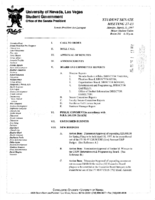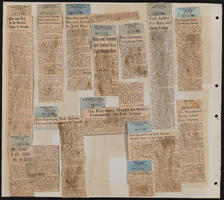Search the Special Collections and Archives Portal
Search Results

Stewart family histories
Date
Archival Collection
Description
Stewart family histories
Text

Jack Weinstein and Polly Weinstein interview, April 12, 2018: transcript
Date
Archival Collection
Description
Tower of Jewels is one of those iconic Las Vegas businesses that continues to thrive. At the time of this interview, Jack Weinstein is in his nineties and “retired.” With him is his daughter Polly Weinstein, who in addition to being involved in the business management has her own custom designed jewelry line, aptly named The Jeweler’s Daughter. As the youngest of six children born to Jewish Russian immigrants Joseph and Pauline (Polly is named for her grandmother), Jack was raised in a dangerous neighborhood of Detroit, Michigan. His youthful enterprise included collaborating and then splitting up with his brothers in a jewelry business, before eventually moving west to Los Angles in the early 1960s. On his own, Jack became a wholesale salesperson representing lines of watches to other businesses. Included in his list of clients was Al Sanford’s Tower of Jewels in Las Vegas. The two became friends and Al suggested setting up a partnership between Al’s son and Jack in 1964. Eventually
Text

Mario Sandoval interview, December 6, 2018: transcript
Date
Archival Collection
Description
Interviewed by Claytee White. Mario and his six siblings were reared by a single mother who taught him all of the family recipes. Moving to Las Vegas at four years of age Mario remembers moving into a black neighborhood where the family was not welcomed. All windows in their home were broken into the first night. The family moved the next day. Though the new house was still in an African American neighborhood, they were protected by Vera, their black babysitter. Mario developed the intense work ethic of his mother, and after working in several strip casinos, found his home at the Horseshoe, today's Binion's. He has been there for 33 years; first as a busboy and then becoming a waiter. He is a Culinary Union trained shop student who picketed his beloved work place for ten months during a 1980's labor dispute. His work in life and union benefits have made his a very good life.
Text

Transcript of interview with Lori Chenin-Frankl by Barbara Tabach, June 7, 2016
Date
Archival Collection
Description
Lori provides a wonderful narrative of her Judaism, her love of teaching children and her devotion to family and music. She talks about growing up in Las Vegas and becoming a bat mitzvah, a rarity for girls in 1973. Throughout her life, including the period where she moved around with her Air Force husband, she sought Jewish connections to help her feel at home no matter where she was.
Text

Diane Orgill oral history interview: transcript
Date
Archival Collection
Description
Oral history interview with Diane Orgill conducted by Claytee D. White on March 30, 2018 for the Remembering 1 October Oral History Project. In this interview, Diane Orgill, a volunteer with Red Cross, discusses her experience on the night of the October 1, 2017 mass shooting in Las Vegas, Nevada. She speaks of her role as a Red Cross representative at the Emergency Operations Center and the efforts of the Red Cross command center to provide a sense of order in the chaos. She describes some of the support provided to the survivors through the Family Assistance Center and the Disaster Action Team, giving an in-depth explanation of how these sections of the Red Cross function.
Text

Meeting minutes for Consolidated Student Senate University of Nevada, Las Vegas, March 31, 1997
Date
Archival Collection
Description
Text

Meeting minutes for Consolidated Student Senate University of Nevada, Las Vegas, August 22, 1994
Date
Archival Collection
Description
Text

Congregation Ner Tamid roundtable oral history interview: transcript
Date
Archival Collection
Description
Oral history interview with the Congregation Ner Tamid roundtable conducted by Barbara Tabach on September 21, 2016 for the Southern Nevada Jewish Heritage Project. In this interview, Rabbi Sanford Akselrad and five members of the congregation discuss the founding of Congregation Ner Tamid, the first reform synagogue in Las Vegas, Nevada, in 1974. They go into detail on how the synagogue was formed, the building-hopping they did until they built their current structure, and the funding it took to get to that point. The interviewees reveal a few donors, such as Morris Dalitz and Frank Sinatra, who helped to build their synagogue and school. The interview ends with meaningful stories and memories the members have relating to Congregation Ner Tamid.
Text


